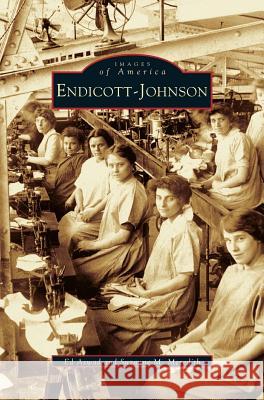Endicott-Johnson » książka
Endicott-Johnson
ISBN-13: 9781531608835 / Angielski / Twarda / 2003 / 130 str.
The Endicott-Johnson Corporation emerged from the modest Lester Brothers Company, manufacturers of boots and shoes, that began in 1854. It was created through the tenacity and vision of great American entrepreneur George F. Johnson. Johnson rose from abject poverty to ownership of one of the largest shoe industries in the world. The village of Endicott was built by Johnson c. 1901, and the Triple Cities of Binghamton, Johnson City, and Endicott made up a classic shoe town USA. At its peak, during the 1920s and 1930s, EJ employed twenty thousand people. The monumental impact of corporate policies on life and the local landscape survived long after company doors closed.Endicott-Johnson combines nostalgia, insight, stories, and memories from area residents. This volume offers a comprehensive view into the lives of early-twentieth-century factory workers and the men who guided the corporation into the annals of industrial history. The EJ brand of "welfare capitalism" resulted in a company town where employee benefits nearly overshadowed the making of shoes and where intense loyalty to the company still exists. Revolutionary labor-relation policies and a benevolent relationship between corporation and community made EJ an example of a "square deal" business.
The Endicott-Johnson Corporation emerged from the modest Lester Brothers Company, manufacturers of boots and shoes, that began in 1854. It was created through the tenacity and vision of great American entrepreneur George F. Johnson. Johnson rose from abject poverty to ownership of one of the largest shoe industries in the world. The village of Endicott was built by Johnson c. 1901, and the Triple Cities of Binghamton, Johnson City, and Endicott made up a classic shoe town USA. At its peak, during the 1920s and 1930s, EJ employed twenty thousand people. The monumental impact of corporate policies on life and the local landscape survived long after company doors closed.
Endicott-Johnson combines nostalgia, insight, stories, and memories from area residents. This volume offers a comprehensive view into the lives of early-twentieth-century factory workers and the men who guided the corporation into the annals of industrial history. The EJ brand of "welfare capitalism" resulted in a company town where employee benefits nearly overshadowed the making of shoes and where intense loyalty to the company still exists. Revolutionary labor-relation policies and a benevolent relationship between corporation and community made EJ an example of a "square deal" business.











